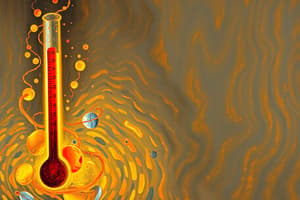Podcast
Questions and Answers
What is temperature?
What is temperature?
- The amount of heat energy in an object
- The quantity that tests how hot or cold something is compared with a standard (correct)
- The measure of the density of a substance
- The force of particles in an object
What is a result of kinetic energy?
What is a result of kinetic energy?
Temperature
What is the formula for kinetic energy?
What is the formula for kinetic energy?
KE: 1/2mv²
Not all particles in an object have the same ______.
Not all particles in an object have the same ______.
What does 0° Kelvin represent?
What does 0° Kelvin represent?
What is heat?
What is heat?
Matter contains energy, not ______.
Matter contains energy, not ______.
Heat always flows from where to where?
Heat always flows from where to where?
What is thermal energy?
What is thermal energy?
What is thermal contact?
What is thermal contact?
What is thermal equilibrium?
What is thermal equilibrium?
What is internal energy?
What is internal energy?
How is heat measured?
How is heat measured?
What is a calorie?
What is a calorie?
What is a kilocalorie or Calorie?
What is a kilocalorie or Calorie?
How many joules are in 1 Calorie?
How many joules are in 1 Calorie?
What is specific heat?
What is specific heat?
What happens to the motion of molecules in a substance when heated?
What happens to the motion of molecules in a substance when heated?
What happens to the motion of molecules in a substance when cooled?
What happens to the motion of molecules in a substance when cooled?
What is a bimetallic strip?
What is a bimetallic strip?
Water has a much higher [blank] for storing energy than most materials.
Water has a much higher [blank] for storing energy than most materials.
What happens to water at 4°C?
What happens to water at 4°C?
Flashcards are hidden until you start studying
Study Notes
Temperature and Heat
- Temperature measures how hot or cold an object is relative to a standard.
- It results from the kinetic energy of particles within an object.
- Kinetic energy (KE) is calculated using the formula: KE = 1/2 mv².
Energy and Particle Motion
- Not all particles in an object possess the same energy level.
- At 0° Kelvin, known as absolute zero, there is no kinetic energy and all particle motion ceases.
Heat Transfer
- Heat is energy transferred between objects due to a temperature difference.
- Matter contains energy rather than heat itself.
- Heat naturally flows from areas of high temperature to areas of low temperature.
Concepts of Thermal Energy
- Thermal energy results from heat flow and is derived from the internal energy of particles.
- Thermal contact refers to heat transfer when two substances are in direct contact.
- Thermal equilibrium occurs when two objects in contact reach the same temperature, and heat transfer ceases.
Internal Energy
- Internal energy is the total of all forms of energy (potential, kinetic, etc.) within a substance.
Measurement of Heat
- Heat transfer can be measured via the temperature change of a known mass of water absorbing heat.
- A calorie is defined as the heat required to raise the temperature of 1 gram of water by 1°C.
- A kilocalorie (Calorie) equals 1000 calories.
- 1 Calorie is equivalent to 4180 joules.
Specific Heat and Molecular Motion
- Specific heat is the heat needed to increase the temperature of 1 kg of a substance by 1°C.
- When heated, molecules in a substance move faster, while cooling causes them to move slower.
Bimetallic Strip
- A bimetallic strip consists of two strips made from different materials, which expand at different rates.
Water's Unique Properties
- Water exhibits a remarkably high heat capacity, making it efficient in energy storage.
- At 4°C, water experiences the greatest contraction and is at its most dense.
Studying That Suits You
Use AI to generate personalized quizzes and flashcards to suit your learning preferences.




